— For Immediate Release —
VOLUNTEERS OF LEGAL SERVICE ANNOUNCES ITS 2023 PRO BONO DEAN’S LIST
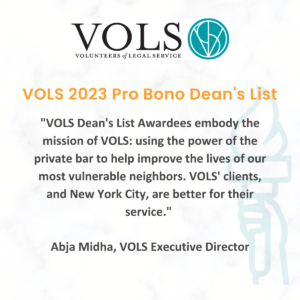
NEW YORK, NY – October 2, 2023
Volunteers of Legal Service (VOLS) is proud to announce the VOLS 2023 Pro Bono Dean’s List, recognizing 15 hardworking and dedicated individuals who have made a tremendous impact in helping VOLS’ clients – low-income and under-resourced New Yorkers – access legal support and obtain dignity, security, and opportunity. Our Dean’s List awardees come from several law firms and companies across New York City’s private bar and have worked across VOLS’ various legal services projects to serve our clients.
In 1984, the VOLS Pro Bono Pledge, the first of its kind, sent a message. It has been understood since throughout the New York City bar that pro bono work is the duty of every law firm and lawyer, and it should be valued as highly as paid work. As it was then, pro bono remains at the heart of VOLS’ mission.
VOLS Pro Bono Dean’s List is dedicated to the memory of William J. Dean, VOLS’ former Executive Director of 25 years, who served as a pro bono champion and thought leader throughout his career. Please take a moment to watch VOLS’ moving Tribute to Bill Dean to better understand VOLS’ legacy of pro bono service in New York City.
To recognize and celebrate our 2023 Dean’s List, VOLS will share information about our pro bono program and Dean’s List awardees throughout October, which is National Pro Bono Month, on our website, in our newsletter, and on social media. During the week of October 23, National Celebration of Pro Bono Week, VOLS will highlight each of our Dean’s List Awardees on our website and social media channels.
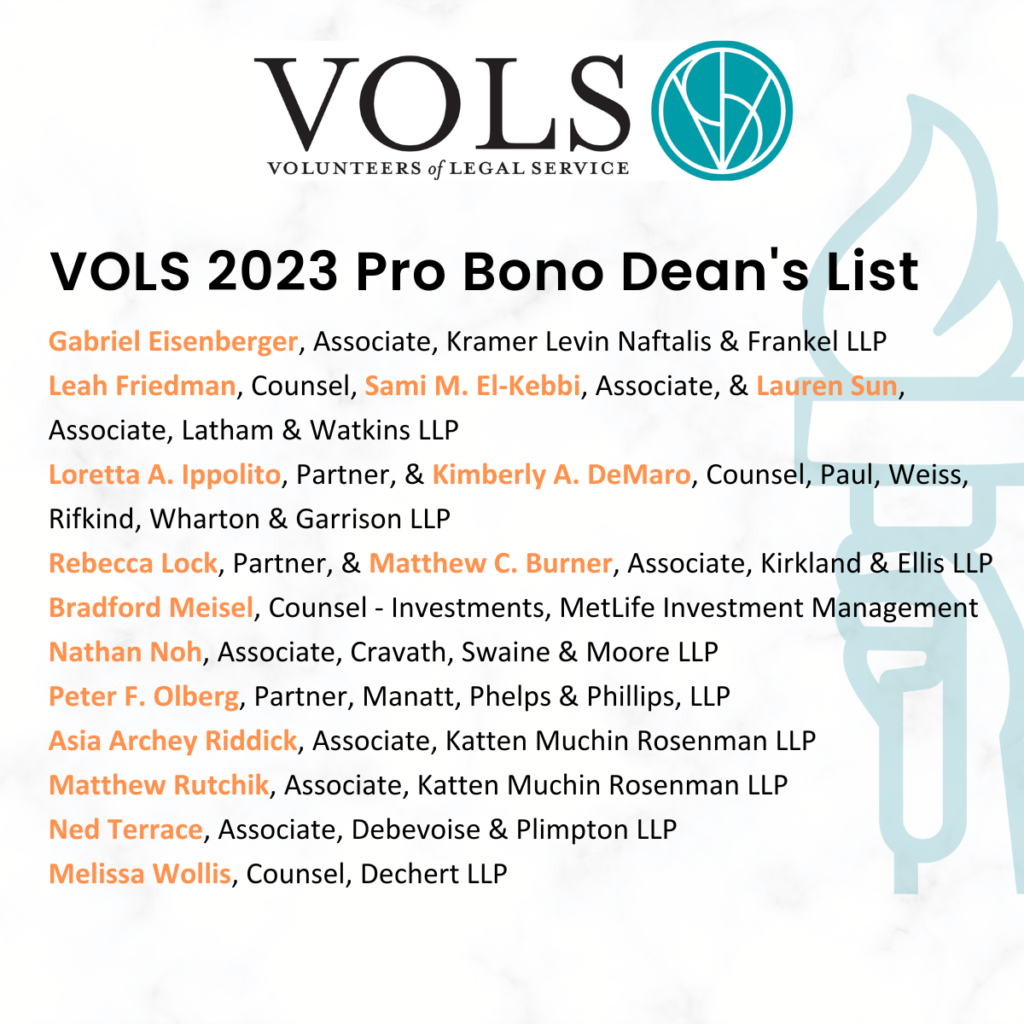
CONTACT:
Amy Bonderoff
Director, Development & Communications
abonderoff@volsprobono.org
Dean’s List Awardee Features:
October 16, 2023
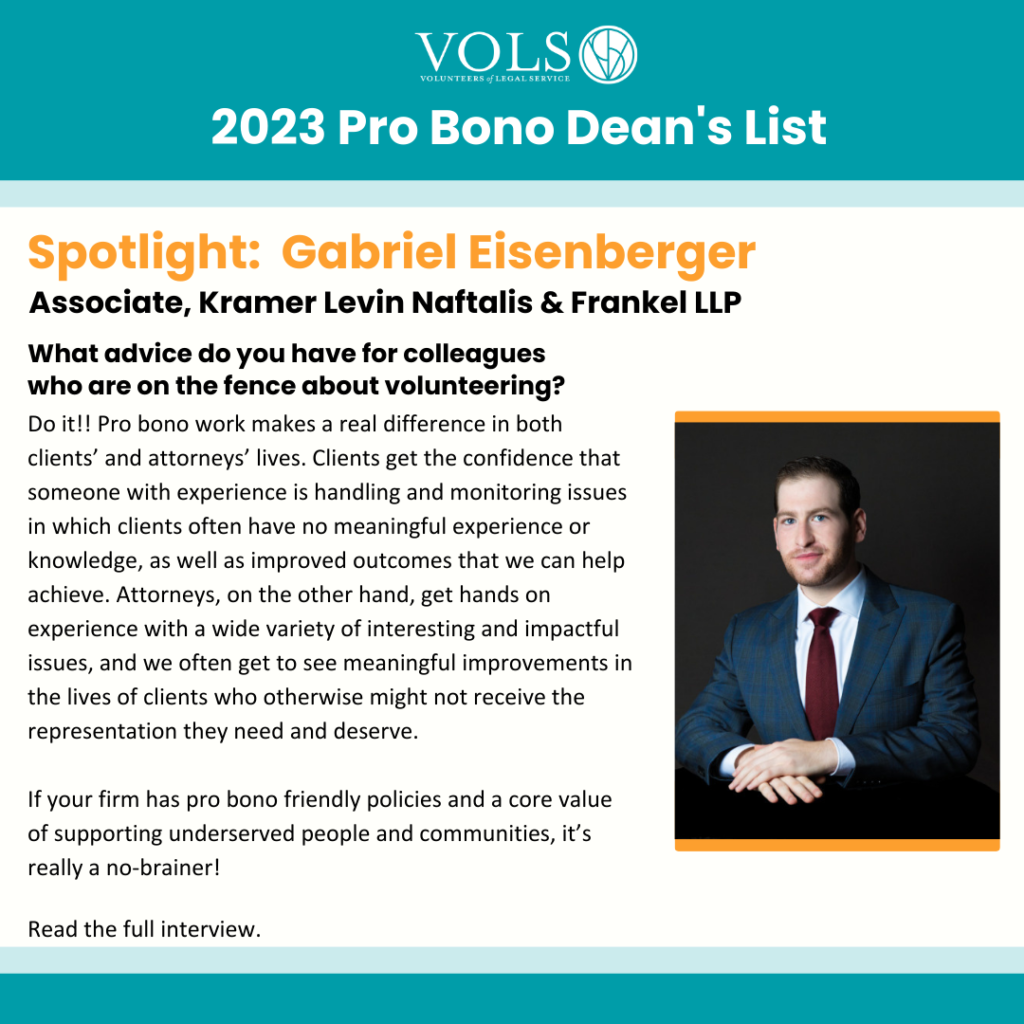
Gabriel Eisenberger
Associate, Kramer Levin Naftalis & Frankel LLP
How did you become involved with VOLS? What interested you in volunteering with this specific project?
I first became involved through a longstanding program VOLS and Kramer Levin run to support low-income parents of children in P.S. 188. Rita Celebrezze D’Souza, a tax lawyer at my firm, reached out to attorneys participating in the program looking for someone to help a client with an issue in housing court and a potential court appearance the following week. I had the bandwidth to take on the case, and I was excited for the opportunity to represent a client and potentially appear in court.
How has pro bono work impacted your experience as an attorney?
In addition to giving me the opportunity to work hands on with clients on issues that sometimes have an immediate and significant impact on their lives, my pro bono work has given me the opportunity to gain substantive experience and branch out—with essential institutional support from Kramer Levin and pro bono organizations like VOLS—in various areas of law where it would otherwise be difficult to gain exposure and experience.
Is there a pro bono moment and/or client that you found particularly memorable?
My first court appearance! We had worked out a settlement of a motion to hold the housing authority in contempt for failure to complete home repairs they had stipulated, and failed, to complete. Appearing in the housing court on our client’s behalf to present the settlement to the judge was a satisfying way to savor the accomplishment and the favorable outcome, which was the culmination of months of work.
Tell us about how you have worked with VOLS’ legal team.
Jim Fenton, a senior staff attorney at VOLS, was my contact and support in the above mentioned housing issue, and I could not have confidently and competently represented our client without all his advice and guidance. He was always available, and made sure that our client was getting the right advice and assistance at every step along the way.
What advice do you have for colleagues who are on the fence about volunteering?
Do it!! Pro bono work makes a real difference in both clients’ and attorneys’ lives. Clients get the confidence that someone with experience is handling and monitoring issues in which clients often have no meaningful experience or knowledge, as well as improved outcomes that we can help achieve. Attorneys, on the other hand, get hands on experience with a wide variety of interesting and impactful issues, and we often get to see meaningful improvements in the lives of clients who otherwise might not receive the representation they need and deserve. If your firm has pro bono friendly policies and a core value of supporting underserved people and communities, it’s really a no-brainer!
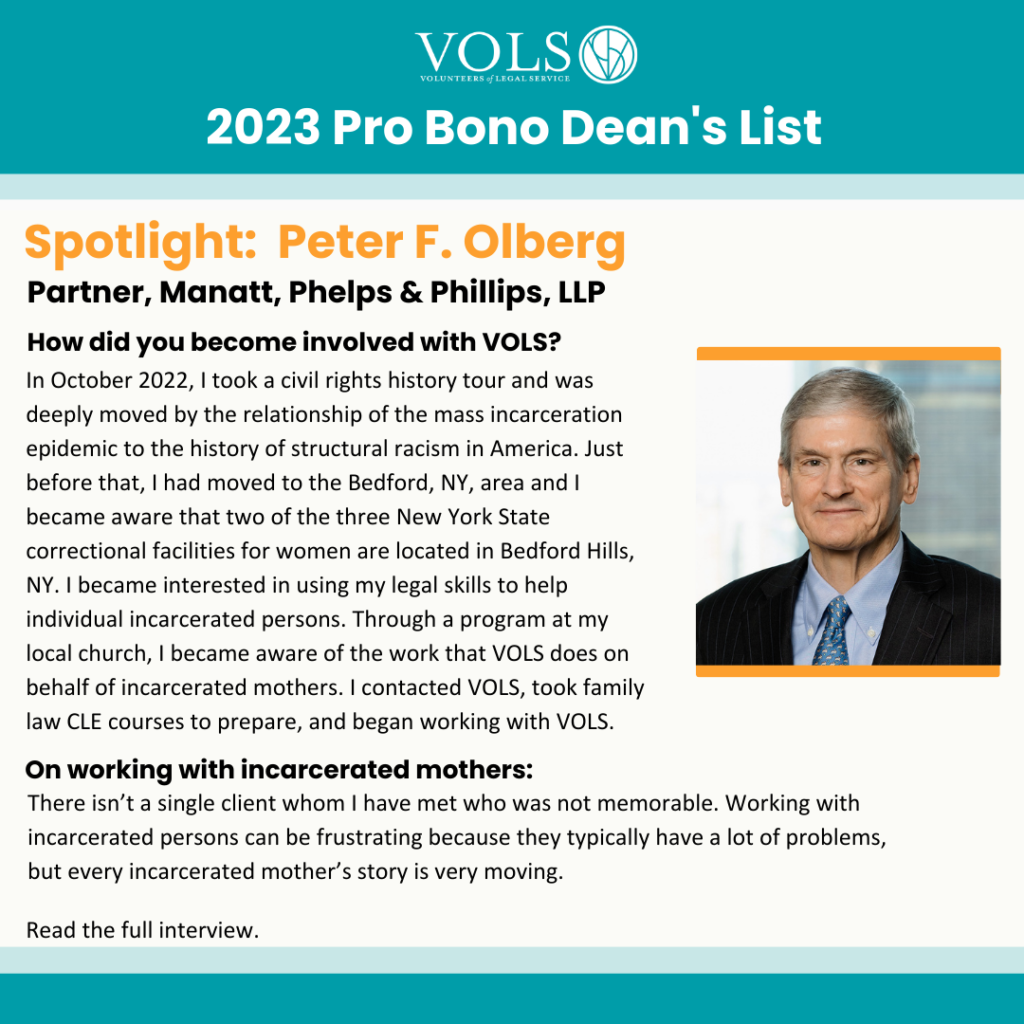
Peter F. Olberg
Partner, Manatt, Phelps & Phillips, LLP
How did you become involved with VOLS? What interested you in volunteering with this specific project?
In October, 2022, I took a civil rights history tour and was deeply moved by the relationship of the mass incarceration epidemic to the history of structural racism in America. Just before that, I had moved to the Bedford, NY, area and I became aware that two of the three NY state correctional facilities for women are located in Bedford Hills, NY. I became interested in using my legal skills to help individual incarcerated persons. Through a program at my local church I became aware of of the work that VOLS does on behalf of incarcerated mothers. I contacted Stephanie Taylor at VOLS, took family law CLE courses to prepare, and began working with VOLS.
How has pro bono work impacted your experience as an attorney?
My work with VOLS has been very meaningful and has involved me in client experiences that are of a kind that is entirely new for me.
Is there a pro bono moment and/or client that you found particularly memorable?
Most of my work has been with one client. I have done intakes at legal clinics on site at correctional facilities. There isn’t a single client whom I have met who was not memorable. Working with incarcerated persons can be frustrating because they typically have a lot of problems, but every incarcerated mother’s story is very moving
Tell us about how you have worked with VOLS’ legal team.
I have worked principally with Stephanie Taylor. She is an excellent attorney and a great teacher, and she has broad relevant experience. I have learned a tremendous amount from her and I rely on her as a mentor and partner in my work for VOLS.
What advice do you have for colleagues who are on the fence about volunteering?
Just go to one legal clinic for incarcerated mothers and you won’t be able to forget the stories you hear. There can’t be greater motivation to help than that.
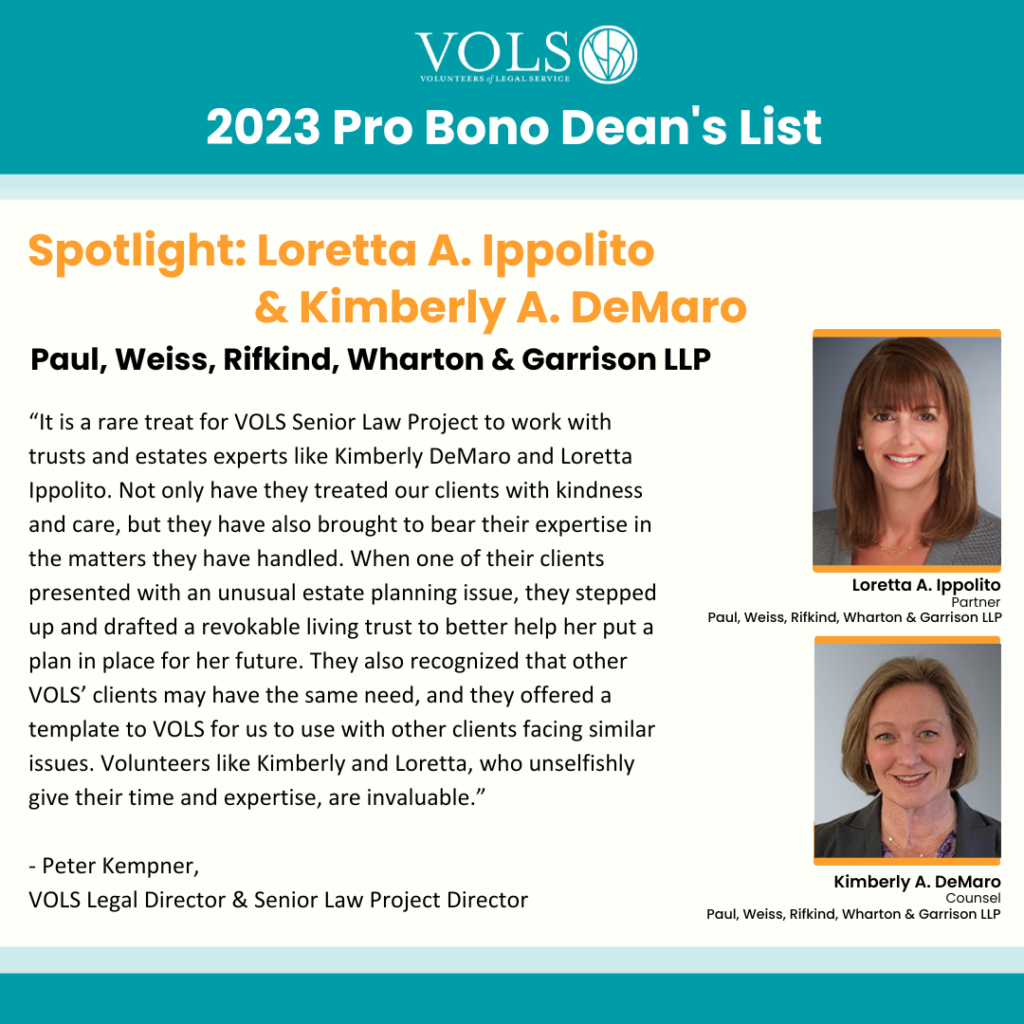
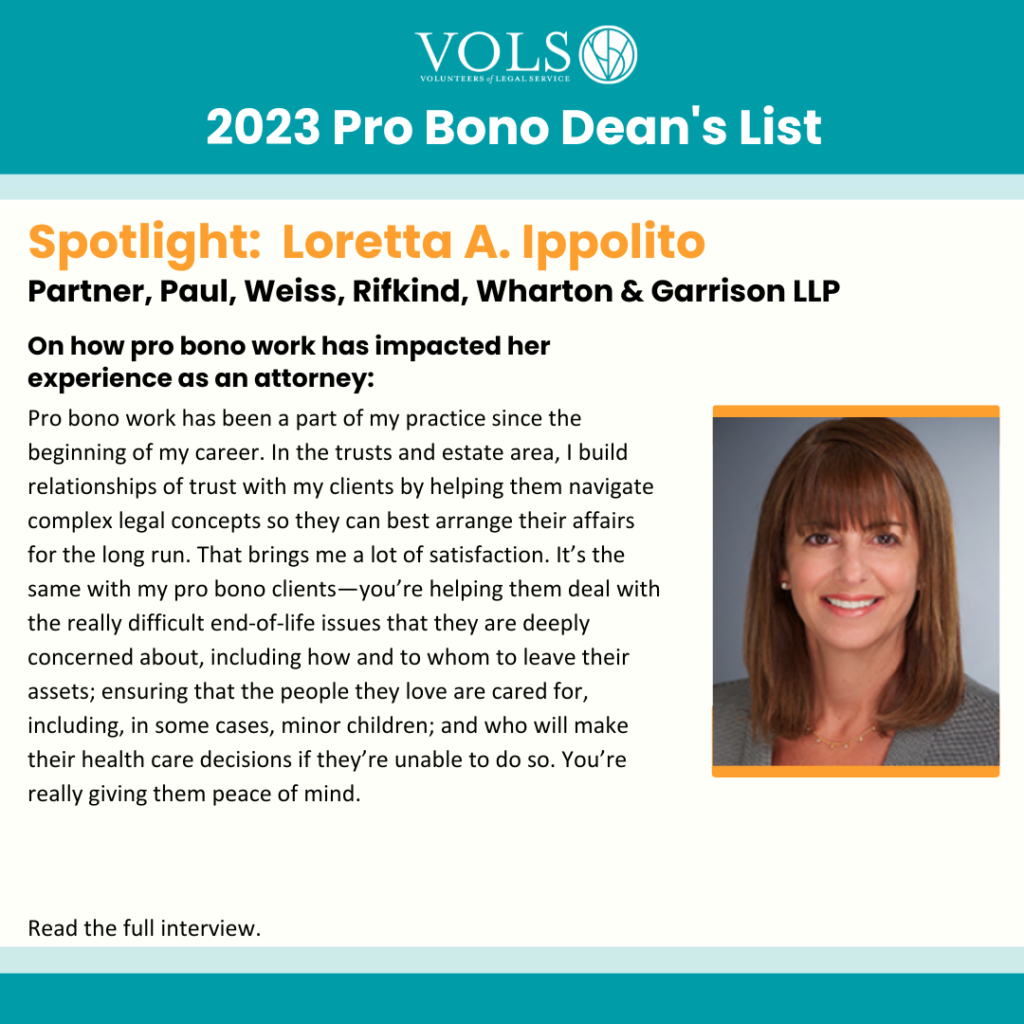
Loretta A. Ippolito
Partner, Paul, Weiss, Rifkind, Wharton & Garrison LLP
How did you become involved with VOLS? What interested you in volunteering with this specific project?
I became a volunteer in VOLS’ Senior Law Project though our firm, which has one of the legal industry’s most highly regarded pro bono platforms and a long relationship with VOLS. Our trusts and estates practice has always been involved in efforts to help the most vulnerable members of our society get their affairs in order, whether the terminally ill, or elderly people without the resources to handle end-of-life legal matters on their own. It’s a small effort on our part to help our communities and it’s really meaningful to the individual clients.
How has pro bono work impacted your experience as an attorney?
Pro bono work has been a part of my practice since the beginning of my career. In the trusts and estate area, I build relationships of trust with my clients by helping them navigate complex legal concepts so they can best arrange their affairs for the long run. That brings me a lot of satisfaction. It’s the same with my pro bono clients—you’re helping them deal with the really difficult end-of-life issues that they are deeply concerned about, including how and to whom to leave their assets; ensuring that the people they love are cared for, including, in some cases, minor children; and who will make their health care decisions if they’re unable to do so. You’re really giving them peace of mind.
Is there a pro bono moment and/or client that you found particularly memorable?
I’ve worked with scores of individual pro bono clients over the past 34 years, from indigent elderly people to the terminally ill. It’s incredibly satisfying work, and all of the engagements have been memorable. For me today, one of the most satisfying elements of my pro bono work is training junior lawyers across the firm to advise on simple wills and health care proxies, including lawyers not just in my area but in other departments, so that we can reach as many people in need as possible.
Tell us about how you have worked with VOLS’ legal team.
Today, much of my time on pro bono matters is spent training and supervising more junior attorneys so they can continue the legacy of providing pro bono service to individual clients through VOLS.
What advice do you have for colleagues who are on the fence about volunteering?
Volunteering to help others in need is incredibly rewarding, both personally and professionally. Junior attorneys gain the stand-up experience of interacting directly with a client and building their communication skills; for example, when I was a junior associate, my work counseling individuals in need helped me learn how to listen better and how to meet people where they are.
And of course, regardless of where you are in your career, there is the personal satisfaction in helping people who otherwise would fall through the cracks. The payoff is the peace of mind you can bring a pro bono client that they now have a plan and a path forward.
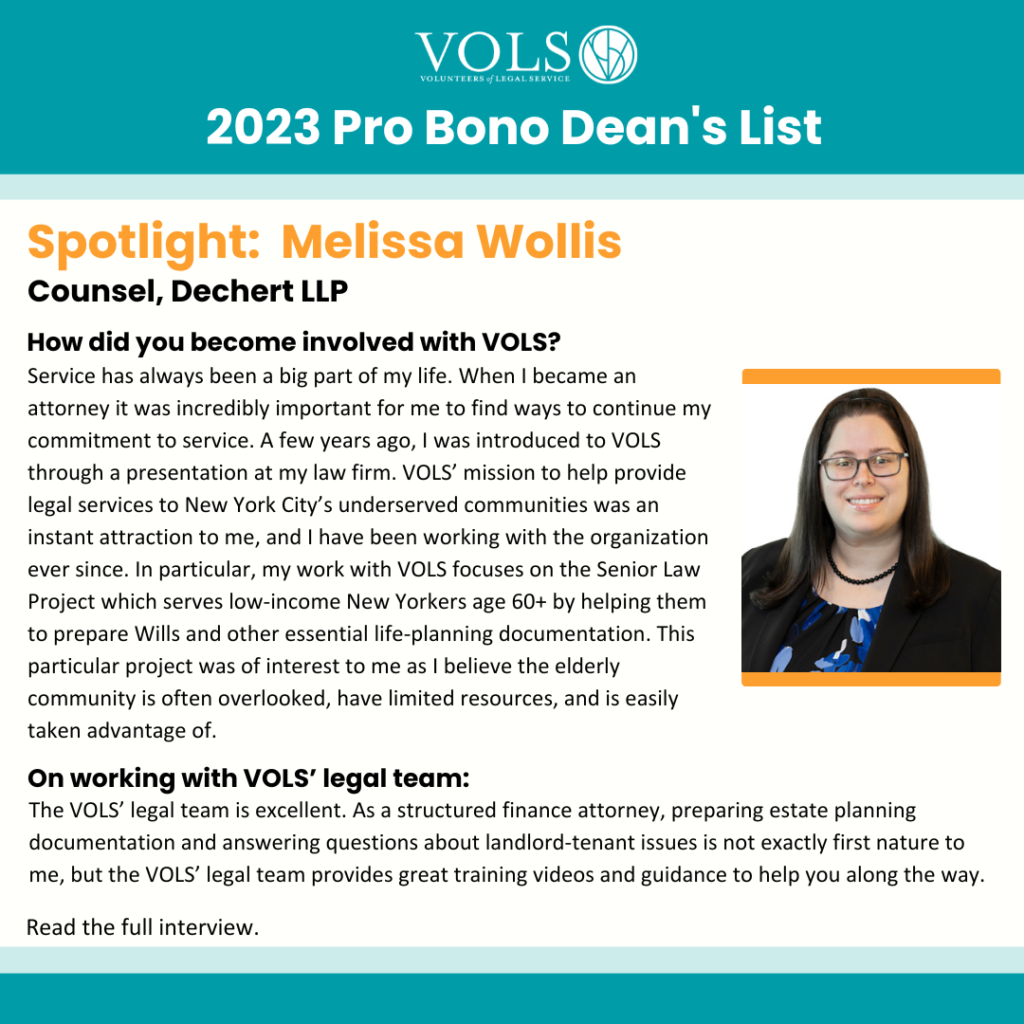
Melissa Wollis
Counsel, Dechert LLP
How did you become involved with VOLS? What interested you in volunteering with this specific project?
Service has always been a big part of my life. When I became an attorney it was incredibly important for me to find ways to continue my commitment to service. A few years ago I was introduced to VOLS through a presentation at my law firm. VOLS’ mission to help provide legal services to New York City’s underserved communities was an instant attraction to me and I have been working with the organization ever since. In particular my work with VOLS focuses on the Senior Law Project which serves low income New Yorkers age 60+ by helping them to prepare wills and other essential life planning documentation. This particular project was of interest to me as I believe the elderly community is often overlooked, have limited resources and are easily taken advantage of. By working with clients through the Senior Law Project I know I am truly making a difference in their lives to help protect their life savings and ensure that their needs are accounted for in the coming years.
How has pro bono work impacted your experience as an attorney?
Being able to participate in pro bono work as an attorney has helped me to feel more fully fulfilled in my professional career. In addition to the personal satisfaction one receives from serving an underserved community, working with pro bono clients on legal issues which are not the same typical issues one may work on day-to-day provides an opportunity to learn about new areas of law and develop new skills, which is intellectually stimulating.
Is there a pro bono moment and/or client that you found particularly memorable?
Yes, last year through the Senior Law Project I worked with a client Jacqueline to prepare her estate planning documents. Her case was interesting because she was the only member of her family who resided on the U.S. and everyone she wanted to name in each of her documents lived in another country. We worked through and determined the best way to draft her documents with the help of Alyssa Villareal and the VOLS’ legal team. Jacqueline was so grateful for the work we did for her and was very expressive of that when she came to our office to execute her documents. It always makes you feel extra happy at the end of the case when the client is outwardly satisfied.
Tell us about how you have worked with VOLS’ legal team.
The VOLS’ legal team is excellent. As a structured finance attorney preparing estate planning documentation and answering questions about landlord- tenant issues is not exactly first nature to me but the VOLS’ legal team provides great training videos and guidance to help you along the way. In particular, I have worked a number of times with Alyssa Villareal. Alyssa always makes herself available to answer any unique questions and review draft documents to provide feedback. It has been a wonderful experience working with her.
What advice do you have for colleagues who are on the fence about volunteering?
If anyone is thinking about volunteering but may have some reservations because they are not familiar with this type of legal work, I would tell them not to be concerned about it because the VOLS’ legal team is there to support you. In fact, they hold office hours over zoom every week where you can just drop in to ask questions. Participating in pro bono work is incredibly rewarding and provides a sense of purpose, particularly when giving one’s time and talent in areas you find meaningful.
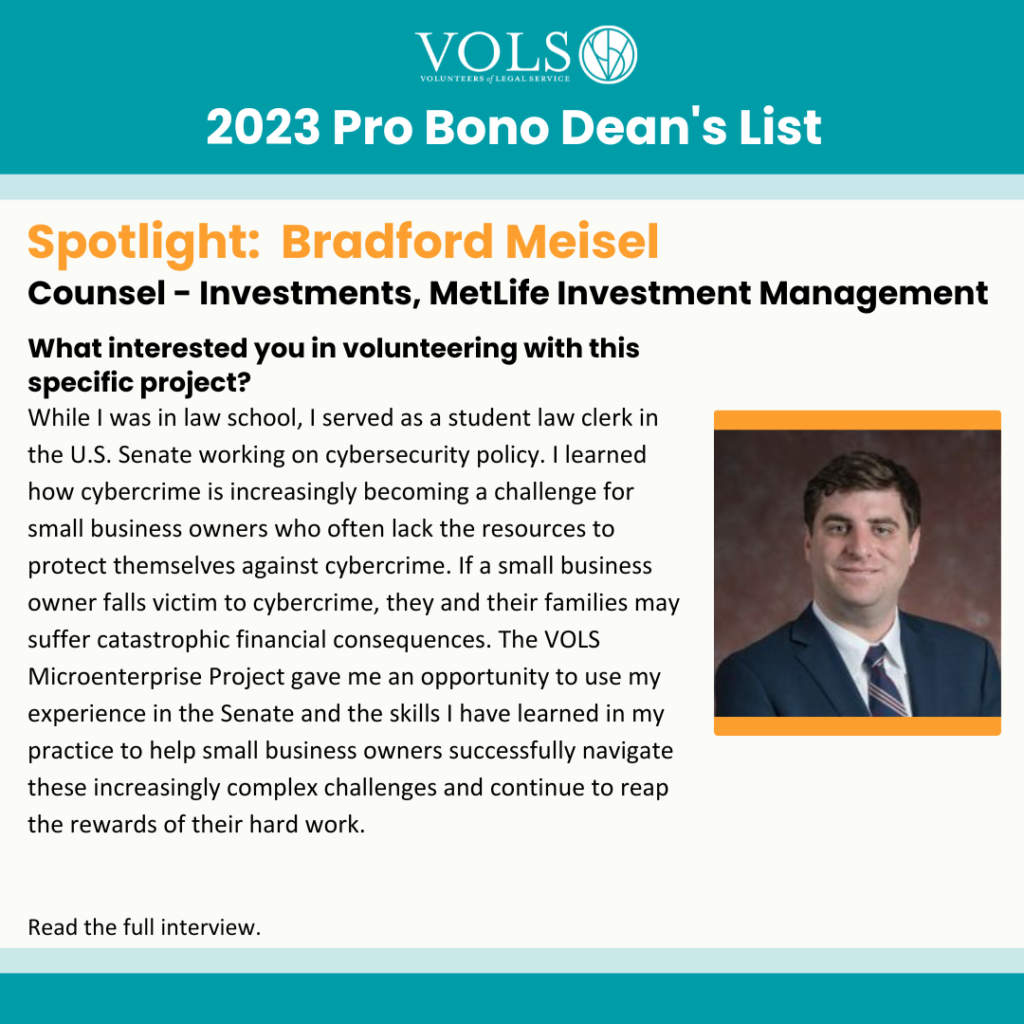
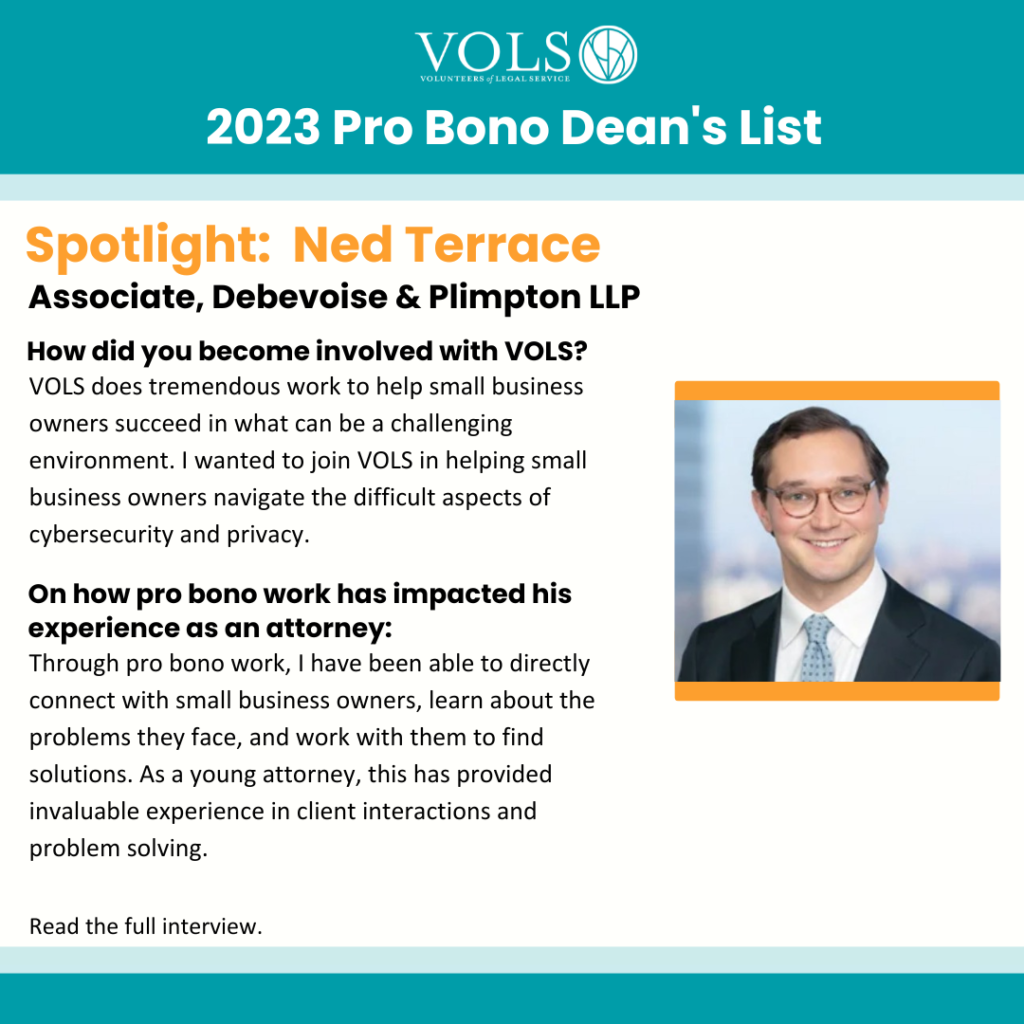
Associate, Debevoise & Plimpton LLP
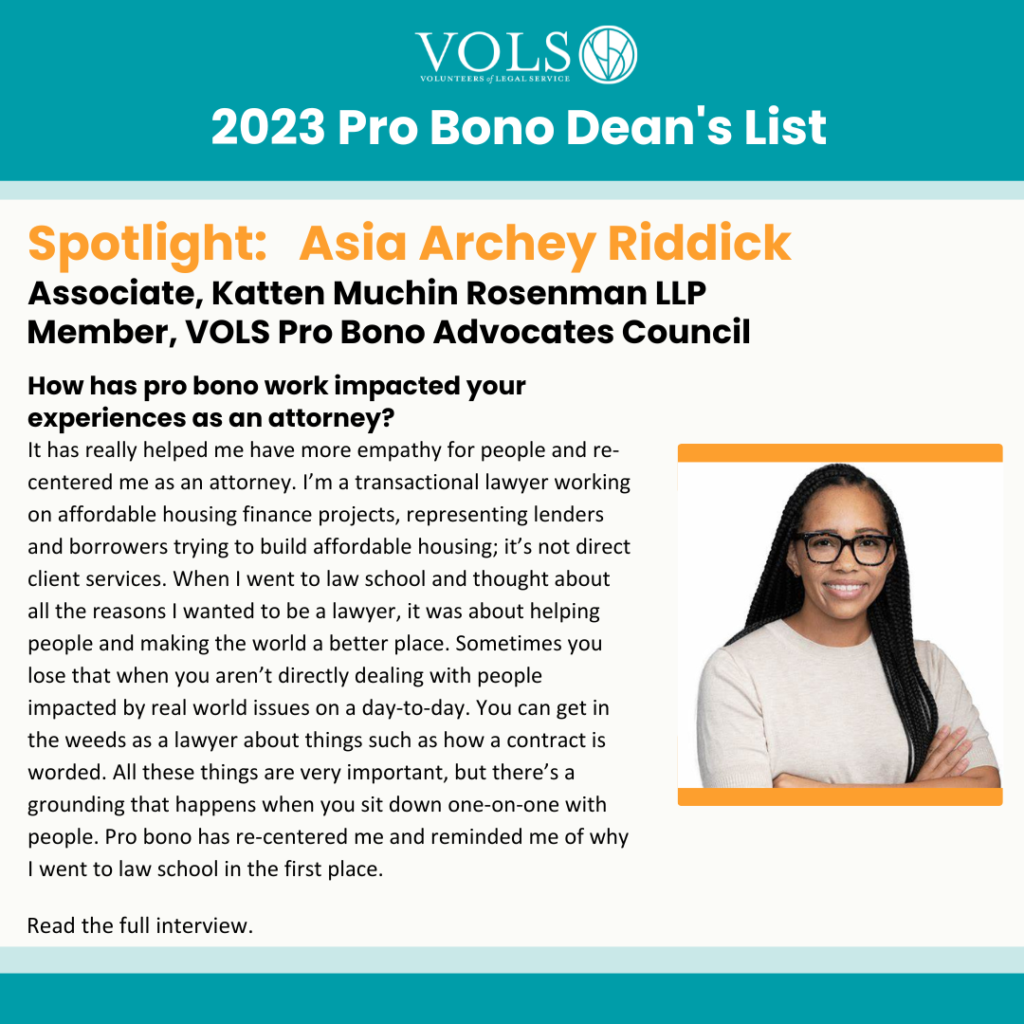
Associate, Katten Muchin Rosenman LLP
Member, VOLS Pro Bono Advocates Council
How did you become involved with VOLS?
I became involved with VOLS through Peter Kempner when I did pro bono with the VOLS Senior Law Project at my previous firm. I participated in a wills clinic where I drafted a will for an older gentleman, and it was a really rewarding experience. After that, in the course of looking for more pro bono opportunities, I met Stephanie Taylor and was introduced to the Incarcerated Mothers Law Project.
What interested you in volunteering with IMLP?
At the time, I was looking for something that I could do that wouldn’t require a huge time commitment and was non-litigation, as I didn’t have a litigation background at the time. IMLP seemed like a great project, and in retrospect I think the opportunity to work with moms resonated with me, as I am a mom myself with some lived experience in the issue area. It seemed serendipitous to help women who were going through similar things as I had and who had fewer means.
How has pro bono work impacted your experiences as an attorney?
It has really helped me have more empathy for people and re-centered me as an attorney. I’m a transactional lawyer working on affordable housing finance projects, representing lenders and borrowers trying to build affordable housing; it’s not direct client services. When I went to law school and thought about all the reasons I wanted to be a lawyer, it was about helping people and making the world a better place. Sometimes you lose that when you aren’t directly dealing with people impacted by real world issues on a day-to-day. You can get in the weeds as a lawyer about things such as how a contract is worded. All these things are very important, but there’s a grounding that happens when you sit down one-on-one with people. Pro bono has re-centered me and reminded me of why I went to law school in the first place.
Is there a pro bono moment or client you found particularly memorable?
As a 1L in law school when I participated in a law clinic for the Unemployment Action Center at NYU Law. It was my first pro bono experience, and it was so rewarding. I represented a woman who had been denied her unemployment benefits and I got to represent her in front of an administrative judge and work through her entire case with her. She was so ashamed of having been fired and the circumstances surrounding it, but once we worked it out, she was totally entitled to benefits and it was a matter of letting her tell her story in a way that highlighted the facts. I really got to see her transition from coming in unsure about what we could actually do for her, and then after having worked with me she came to understand that she was entitled to her benefits and to let go of any shame that she carried. It was incredible to see this transition in my client, and when I came into law school, I was the first generation in my family to go to law school and was feeling my own insecurities. I think helping her to overcome these things helped me to overcome some insecurities that I was dealing with myself.
Another moment that sticks out to me is one with one of my first IMLP clients. I went to visit her in prison before her hearing to communicate about what approach to take. And when I came to visit her, she said she had never had a visitor come because the prison was far away from her family- she had assumed it was someone coming to tell her bad news. We talked about the case for a bit but after that, we just chatted about life. Here’s a person I don’t, on the surface have much in common with, but we ended up having a lot in common and to share that time together. It was a beautiful moment.
How have you worked with the VOLS legal team?
When I first started, I did an online training and also relied a lot on the VOLS pro bono library. There were a lot of templates that I needed, including records requests, or what questions to ask when you first meet with your client. After using those and beginning to really engage with a case, Stephanie Taylor (IMLP Project Director) was there every step of the way to guide you and brainstorm the best avenue to help your client. She knows about each client in depth and is such an amazing resource. She has coached me about filing a petition on a client’s behalf, resources for family court, what to expect from the judge in family court, and she has appeared in court to help supervise as well. The VOLS team is there to help whenever you need help.
What advice do you have for colleagues who are on the fence about volunteering?
Get off the fence! When I started, I had some trepidations about taking something on that took too much time, so I started with clinics. I would recommend that to colleagues who are anxious about time commitment. If someone is nervous to start pro bono because it’s intimidating, I would tell them there’s a lot you can do, and a lot that doesn’t take up too much time. For example, I had an IMLP client who believed that there was an order of protection that prevented her from seeing her kids, when in fact, the order gave her visitation rights. It took all of twenty minutes to find the court where the order was filed, call the court to request the records, and, it drastically changed her set of circumstances. No matter what your skillset is, all of them are useful across the VOLS projects.
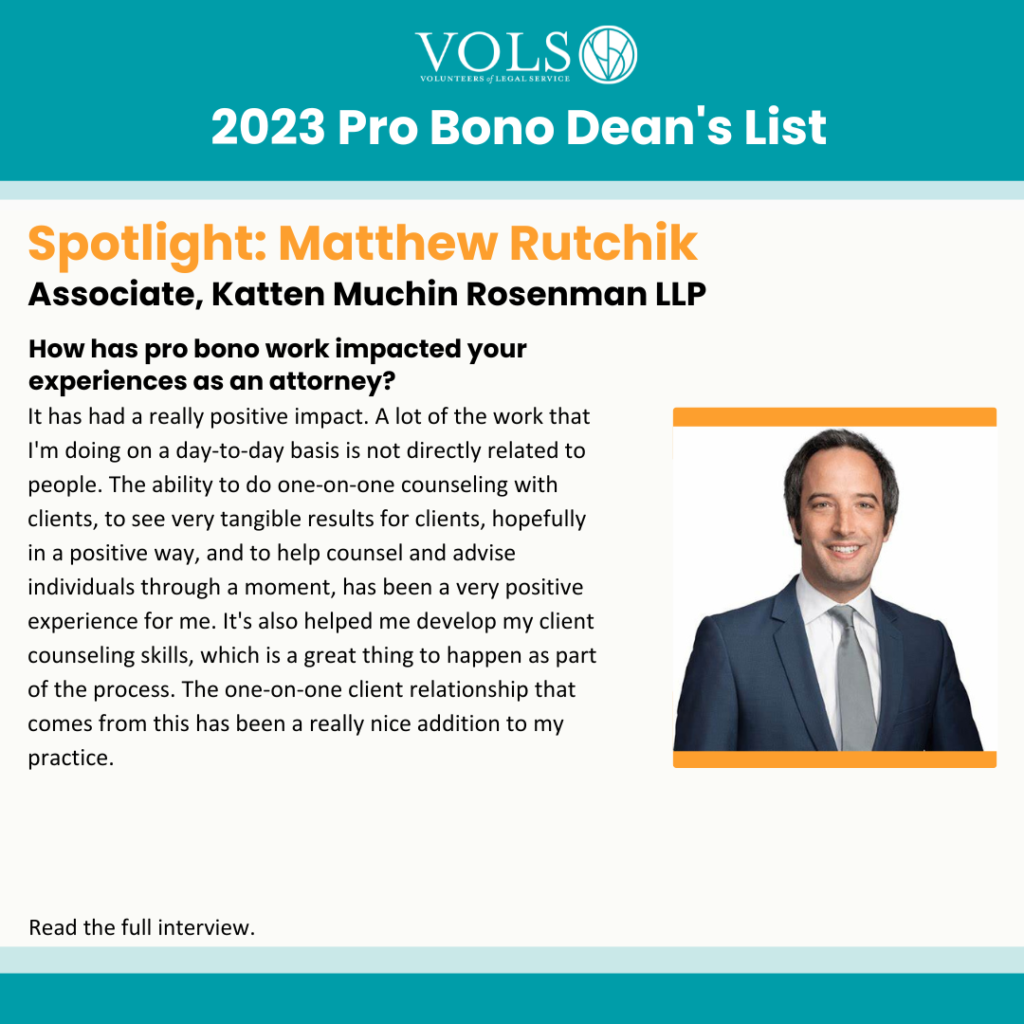
Associate, Katten Muchin Rosenman LLP
How did you become involved with VOLS?
VOLS is one of the local pro bono organizations that Katten partners with to help provide legal services to the community. I became involved through a natural organic process internally. [I was] just reading through opportunities that were available and the partnership with VOLS seemed interesting to me and worthwhile pursuing.
What interested you in volunteering with the Benefits Law Project?
The Benefits Law Project is an area that’s related to my practice area. The specifics of unemployment insurance are not something that we deal with on a day-to-day basis, but, topically, it’s related. It felt like a natural extension.
How has pro bono work impacted your experience as an attorney?
It has had a really positive impact. A lot of the work that I’m doing on a day-to-day basis is not directly related to people. The ability to do one-on-one counseling with clients, to see very tangible results for clients, hopefully in a positive way, and to help counsel and advise individuals through a moment, has been a very positive experience for me. It’s also helped me develop my client counseling skills, which is a great thing to happen as part of the process. The one-on-one client relationship that comes from this has been a really nice addition to my practice.
Is there a pro bono moment and or a client that you found particularly memorable?
Sometimes on a couple of occasions after a hearing we get a result, and, instead of a phone call, I’ll get a handwritten note which is really nice. I think on one occasion it was a holiday card in addition to the thank you. It’s a nice memento, and it is really nice to see that type of expression and gratitude after a positive impact that came out of your time and your efforts.
Tell us a bit more about how you’ve worked with the VOLS legal team.
It’s been seamless. It’s a really good group of people that are very respectful of your time and very responsive to any questions you may have, because they obviously see a greater volume of what you’re helping with. [VOLS legal team is] very collaborative in that regard. It’s been an easy, seamless relationship with availability and help as needed throughout the pro bono client experience.
What advice do you have for colleagues who are on the fence about volunteering?
To just do it. You have time, even if you don’t think you have time. From what I’ve seen, organizations like VOLS are really flexible and open to working around your availability, and to working with it. It helps, even if it’s not really related directly to your area of law, and certainly it helps you develop soft skills and other competencies that make you a better lawyer. In that regard, it’s positive all around.
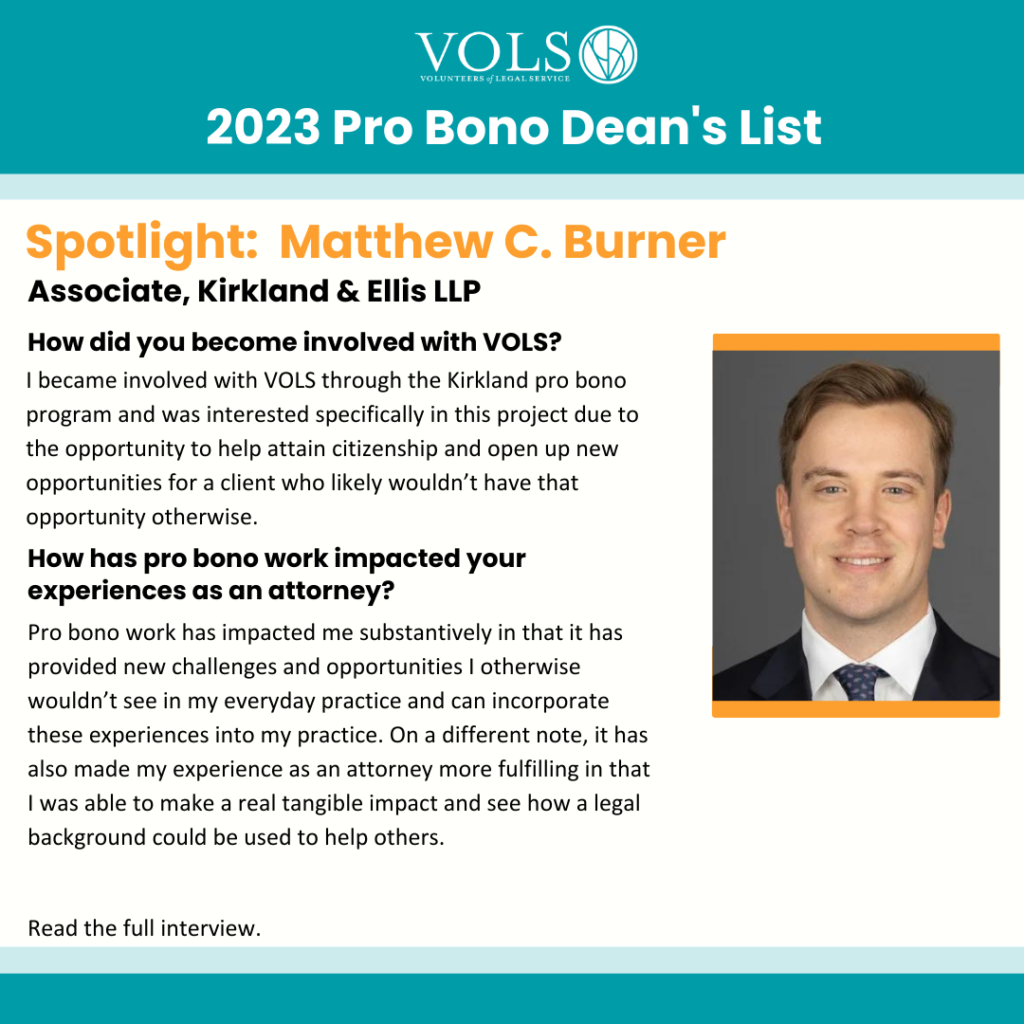
Matthew C Burner
Associate, Kirkland & Ellis LLP
How did you become involved with VOLS? What interested you in volunteering with this specific project?
I became involved with VOLS through the Kirkland pro bono program and was interested specifically in this project due to the opportunity to help attain citizenship and open up new opportunities for a client who likely wouldn’t have that opportunity otherwise.
How has pro bono work impacted your experience as an attorney?
Pro bono work has impacted me substantively in that it has provided new challenges and opportunities I otherwise wouldn’t see in my everyday practice and can incorporate these experiences into my practice. On a different note, it has also made my experience as an attorney more fulfilling in that I was able to make a real tangible impact and see how a legal background could be used to help others.
Is there a pro bono moment and/or client that you found particularly memorable?
As a corporate attorney, I generally don’t appear in courtrooms or consider preparing briefs or related court filings. With this opportunity, however, I was able to appear in family court (even if virtually), which was certainly a new and memorable experience.
Tell us about how you have worked with VOLS’ legal team.
I worked very closely with the VOLS legal team in prepping the necessary paperwork and other related steps to finalize the filing and truly don’t think we would have been able to do it without them. Especially on a tight (and sometimes stressful timeline), they were always very helpful and willing to answer whatever questions we had, even joining evening calls to discuss with our client what the family court experience would be like.
What advice do you have for colleagues who are on the fence about volunteering?
While many volunteer opportunities may seem different than what your ordinary practice looks like and seemingly difficult to add value to, these are often the best to join as they can bring new opportunities that provide a new, unique experience you wouldn’t see otherwise.
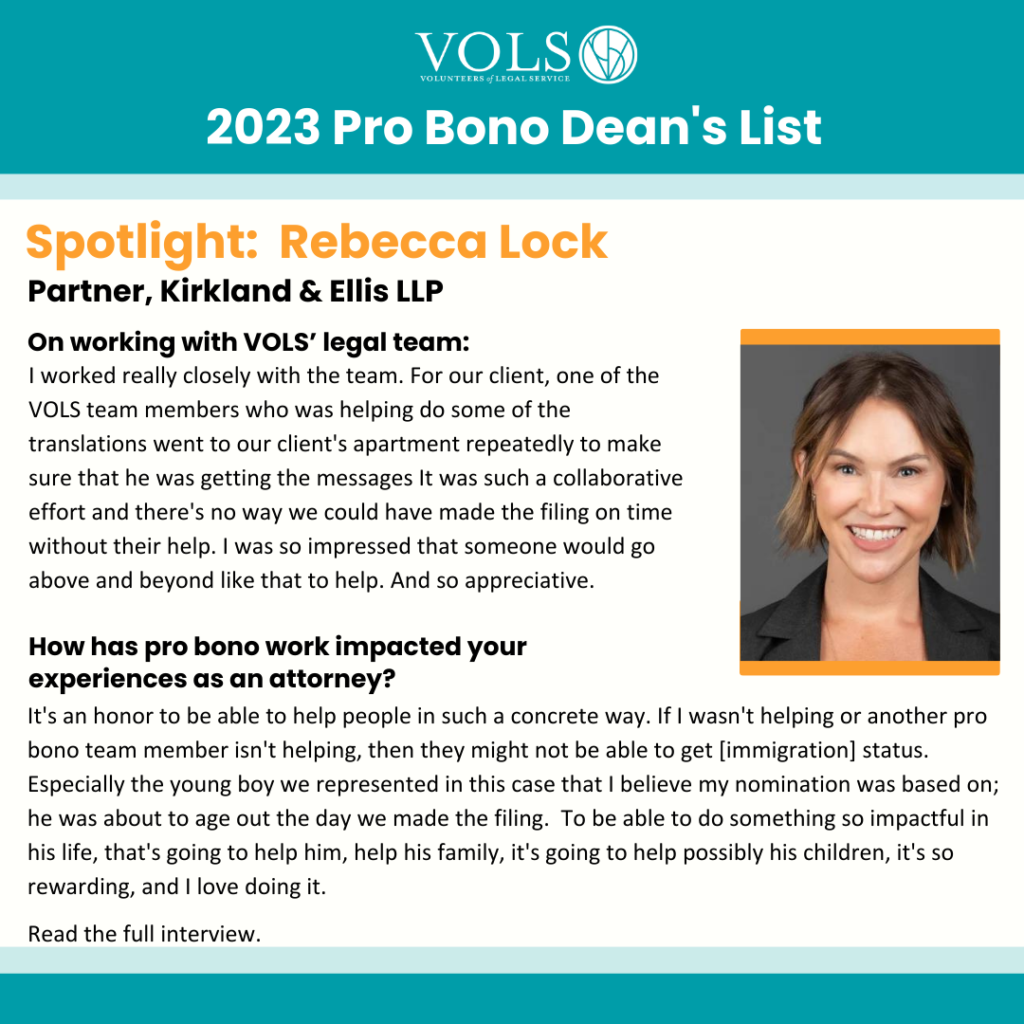
Rebecca Lock
Partner, Kirkland & Ellis LLP
How did you become involved with VOLS?
Well, I’ve always been involved in immigration. I’ve done work in the past so when we got an e-mail from the Kirkland team asking for assistance on a few of these cases, I picked up two. I was able to use my prior experience doing this in Illinois and New Jersey and applying it to New York State Court. I was excited to learn a new process in a different state.
What interested you in volunteering with this specific project?
Children that have been abused, abandoned and neglected. I think we all have an obligation to assist them with anything we can do, and especially as a lawyer. To be able to do something that’s pretty straightforward to give someone the ability to get status here after facing such hardship I think is an obligation as opposed to more of a decision. I think we should all be doing as much pro bono as possible.
How has pro bono work impacted your experience as an attorney?
It’s an honor to be able to help people in such a concrete way. If I wasn’t helping or another pro bono team member isn’t helping, then they might not be able to get [immigration] status. Especially the young boy we represented in this case that I believe my nomination was based on; he was about to age out the day we made the filing. To be able to do something so impactful in his life, that’s going to help him, help his family, it’s going to help possibly his children, it’s so rewarding, and I love doing it.
Tell us about how you’ve worked with the VOLS legal team.
I worked really closely with the team. For our client, one of the VOLS team members who was helping do some of the translations went to our client’s apartment repeatedly to make sure that he was getting the messages It was such a collaborative effort and there’s no way we could have made the filing on time without their help. I was so impressed that someone would go above and beyond like that to help. And so appreciative.
What advice do you have for colleagues who are on the fence about volunteering?
I would say it looks intimidating, but once you get into it there’s so much support from the VOLS staff, and to be able to you know you’re not left alone. With the support of the VOLS team you can take a small amount of your time and disproportionately impact someone’s life. There’s such pride in being able to do that. I think it’s worth the time you have to give.
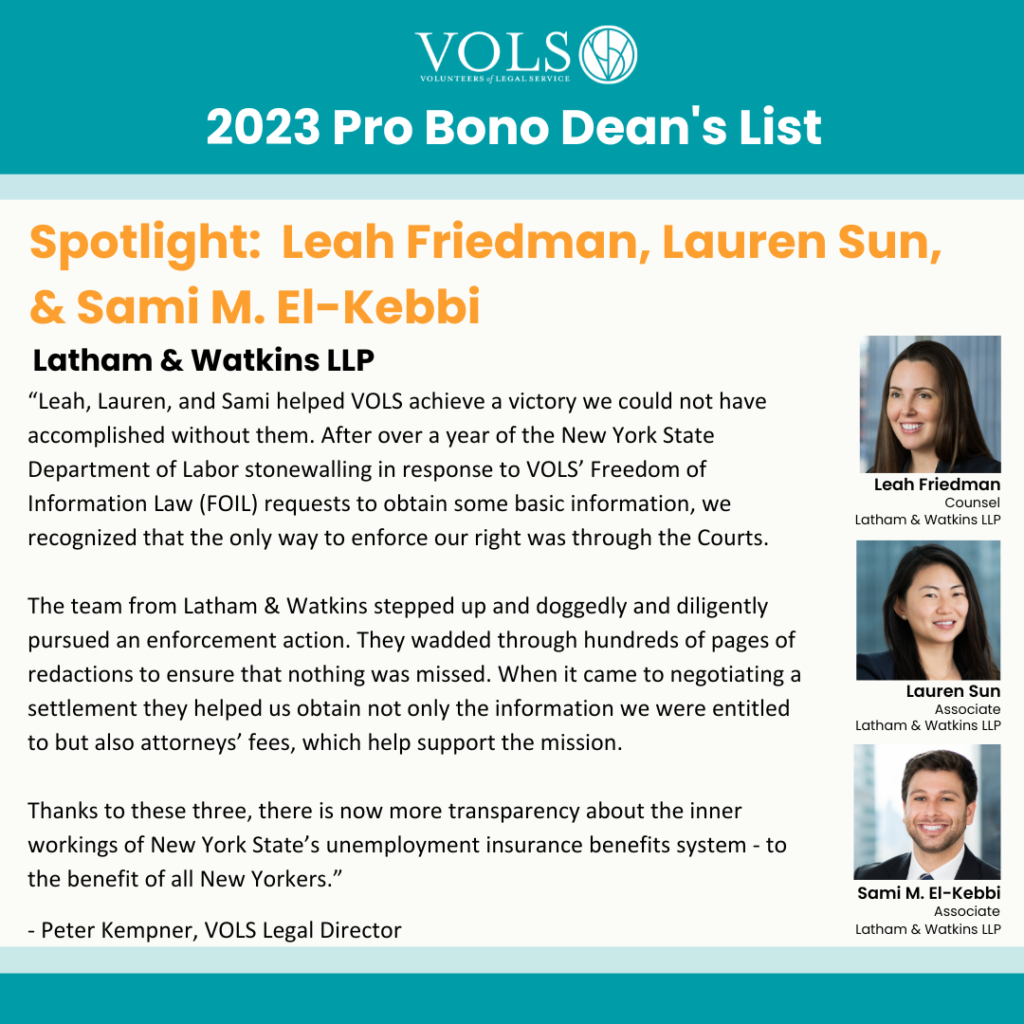
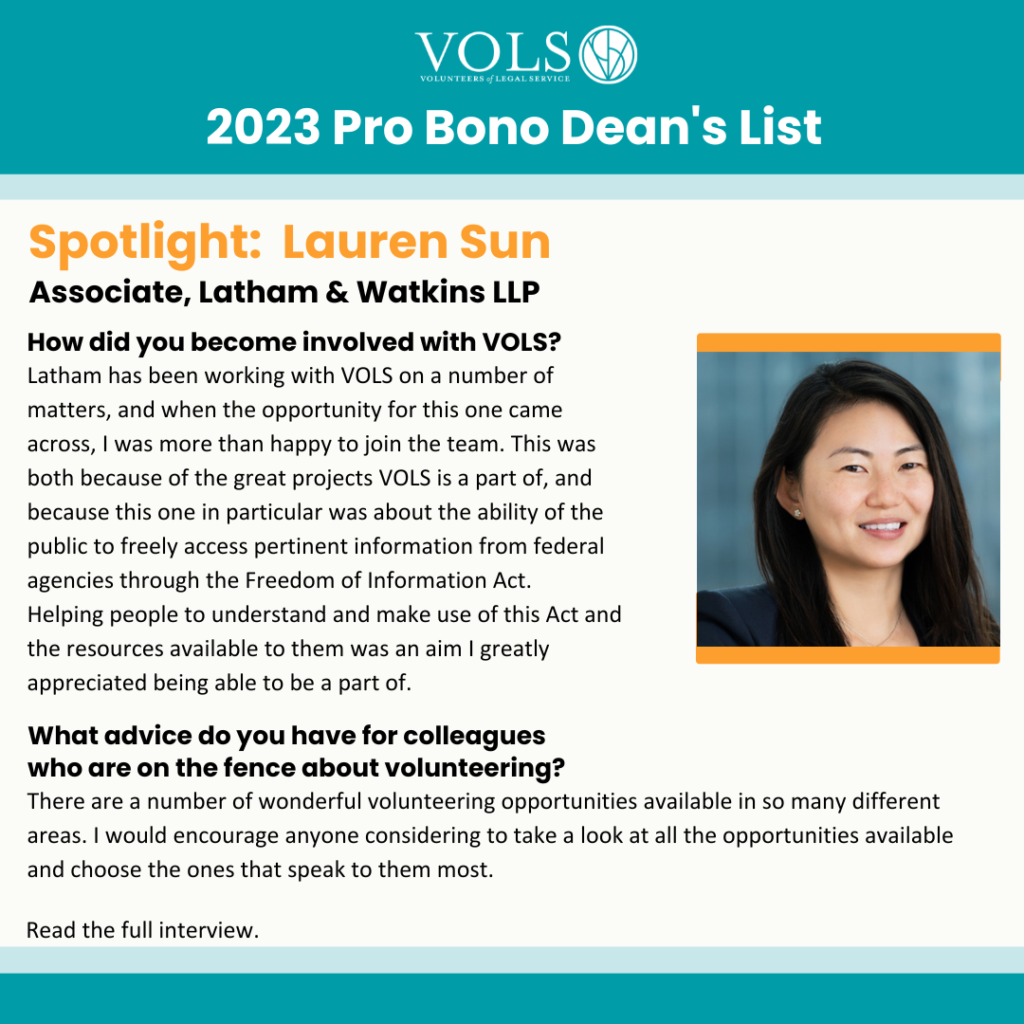
Lauren Sun,
Associate, Latham & Watkins LLP
How did you become involved with VOLS? What interested you in volunteering with this specific project?
Latham has been working with VOLS on a number of matters, and when the opportunity for this one came across, I was more than happy to join the team. This was both because of the great projects VOLS is a part of, and because this one in particular was about the ability of the public to freely access pertinent information from federal agencies through the Freedom of Information Act. Helping people to understand and make use of this Act and the resources available to them was an aim I greatly appreciated being able to be a part of.
How has pro bono work impacted your experience as an attorney? Pro bono has been a wonderful part of my experience as an attorney, from the cases I’ve been able to be a part of, to the people I’ve been able to meet, and the people I’ve been able to work with.
Is there a pro bono moment and/or client that you found particularly memorable? I’ve had many moments through my pro bono experiences that have been memorable, and am grateful for the opportunities I’ve had to work on each of them.
Tell us about how you have worked with VOLS’ legal team. The VOLS team that we worked with were fantastic. It was always a joy speaking to everyone and working together for this project.
What advice do you have for colleagues who are on the fence about volunteering?
There are a number of wonderful volunteering opportunities available in so many different areas. I would encourage anyone consi
dering to take a look at all the opportunities available and choose the ones that speak to them most.
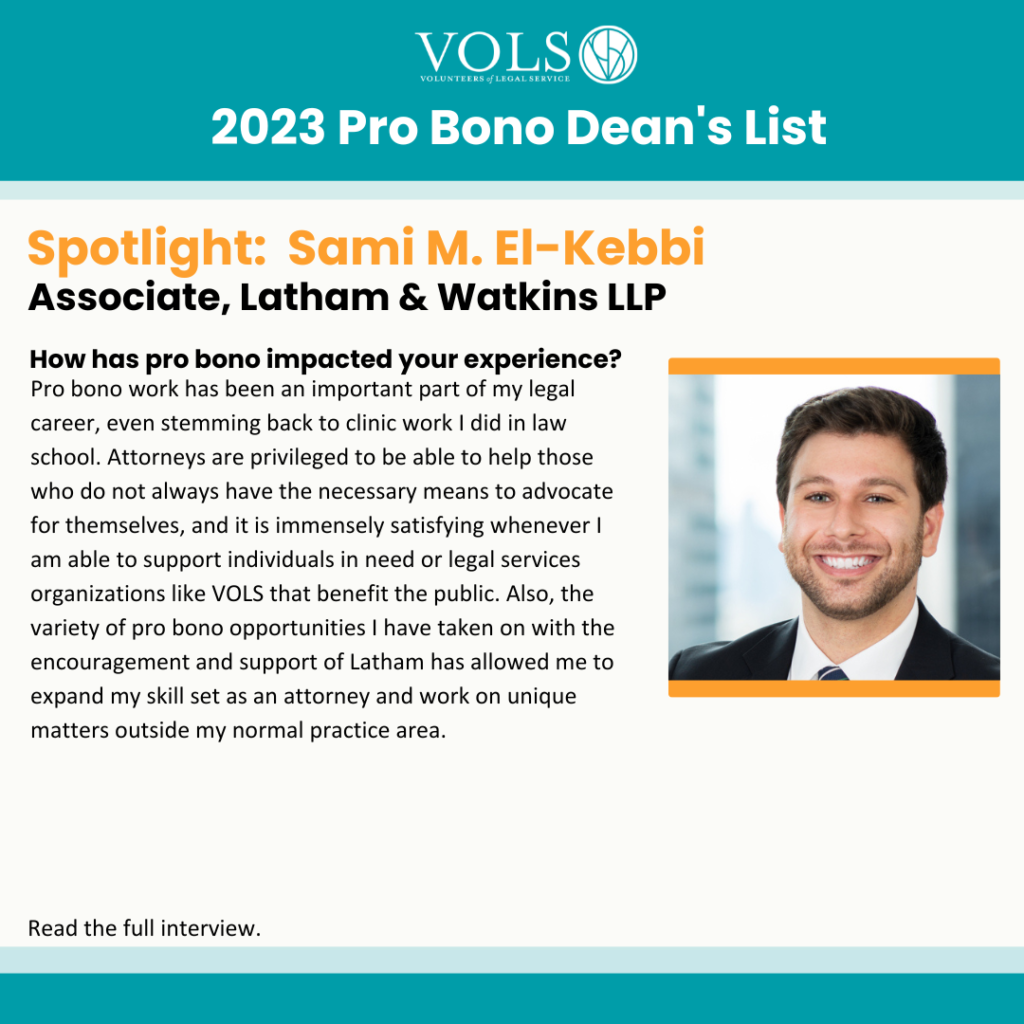
Sami M. El-Kebbi
Associate, Latham & Watkins LLP
How did you become involved with VOLS? What interested you in volunteering with this specific project? I got involved with the Unemployed Workers Project through a partnership between Latham & Watkins LLP and VOLS. While this was my first matter with VOLS, I was eager to build on some prior similar pro bono experiences and support an organization that was serving those adversely impacted by the pandemic.
How has pro bono work impacted your experience as an attorney?
Pro bono work has been an important part of my legal career, even stemming back to clinic work I did in law school. Attorneys are privileged to be able to help those who do not always have the necessary means to advocate for themselves, and it is immensely satisfying whenever I am able to support individuals in need or legal services organizations like VOLS that benefit the public. Also, the variety of pro bono opportunities I have taken on with the encouragement and support of Latham has allowed me to expand my skill set as an attorney and work on unique matters outside my normal practice area.
Is there a pro bono moment and/or client that you found particularly memorable?
While it’s hard to narrow it down, I would have to say there are two matters I was especially proud of. The first is my immigration and asylum work with another organization partnering with Latham, which allowed me to help members of a family achieve U.S. citizenship. The second is my most recent case with VOLS, which resulted in an amicable settlement with a New York State agency. In both of these matters, I was empowered by Latham to take on plenty of ownership, making the happy outcomes for the clients feel that much better.
Tell us about how you have worked with VOLS’ legal team.
The Latham team and I worked primarily with Peter Kempner and Stephanie Taylor at VOLS in our Article 78 litigation against the New York State Department of Labor. We teamed up with VOLS after the Department failed to respond to a number of Freedom of Information Law (FOIL) requests related to unemployment benefits and Department policies (largely as a result of the pandemic). The litigation resulted in both obtaining the documents and information responsive to VOLS’ FOIL requests, as well as securing a settlement for costs associated with the litigation. I was very pleased that we were able to meet VOLS’ goals in this regard.
What advice do you have for colleagues who are on the fence about volunteering?
I think any hesitation attorneys have when it comes to volunteering for pro bono work is either from concern that they do not have the time, or from uncertainty about working in unfamiliar areas of the law. To the former, I would encourage attorneys to make as much time as they are able; even a handful of hours throughout the year can result in a lot of good! For the latter, pro bono work is a great incentive to start branching out and learn new aspects of the law; not to mention the hands-on and more client-facing nature of the work can certainly benefit those across all practice groups.

Nathan Noh
Associate, Cravath, Swaine & Moore LLP
Member, VOLS Pro Bono Advocates Council
How did you become involved with VOLS? What interested you in volunteering with this specific project?
My first interaction with VOLS was through a Children’s Project partnership with a local school. I’ve always enjoyed working with students and young children throughout my life because of their uniquely inspiring blend of curiosity, vibrancy, and resilience, and the VOLS Children’s Project enables me to stay connected with children to provide whatever support I can to help improve their outcomes and set them up for future success. For those less familiar with the Children’s Project and its broad reach, the types of legal issues affecting children and their ability to succeed in school are wide-ranging, from housing assistance, to access to benefits, immigration matters, and more. You never really know what kinds of issues a family will present with, and the only characteristic any two cases have in common is that the family desperately needs high quality legal assistance that we can readily provide. This remains true with my current Children’s Project work at Cravath, where we partner with two local children’s hospitals, and positive legal outcomes can be lifesaving for our clients.
How has pro bono work impacted your experience as an attorney?
Doing pro bono work is like finally receiving the education that our sterile schools and universities often fail to provide us in the normal course. You get to connect with people meaningfully and personally, learning how to communicate an often-nonsensical thicket of complicated legal and non-legal concepts in a practical way to real people that are suffering from real world problems without the resources or arbitrary knowledge to tackle them. Many of our pro bono clients come from a place of trauma, constant fear, and crippling uncertainty, unable to navigate an endless bureaucracy standing in the way of their basic human rights and dignity. Learning to navigate these unpredictable and messy situations is what real lawyering is about—as is accepting that, even as experienced advocates, we’re never going to be perfect in every interaction. These interpersonal lessons are valuable and not often encountered in the rarefied, privileged environment in which we exist working at our private firms. The technical and substantive aspects of lawyering are easy to pick up with enough hard work, mentorship, and experience; the essential human aspect of lawyering is much harder to develop unless you are doing something that impacts the livelihood of a real person vulnerable enough to come to you for help. We learn so much from our clients’ grit.
Is there a pro bono moment and/or client that you found particularly memorable?
It is hard to forget a pro bono client because we impact each other’s lives so profoundly. My facetious answer would be that I’m happiest when we never hear from our client again after a positive outcome because that would mean that everything worked out perfectly, but I know life is much more complicated than that. Obviously, that shared moment you have with a client when we get a “win” is always memorable, but another experience stands out to me much more keenly because it came much earlier in the process. When I first started working with the VOLS Children’s Project, there were significant challenges stemming from joining the team during the pandemic, where our ability to connect with families and take that critical step of building awareness and trust within the community to accept our help was nonexistent. Once we were finally able to return to the school in person for a tabling event (midway through the pandemic with appropriate safety protocols), I remember speaking for hours with families to raise awareness about the program. Nobody really had any advance information about who I was or why I was there—and I don’t generally present as overly approachable—but, to my great surprise, people continuously stopped by to talk to me. I remember speaking with a parent that had taken a couple tries at coming up to the table, whom I was finally able to draw in for an initial conversation about their immigration issues and how we might be able to help. This stands out in my memory because that moment of choosing to speak with me—a complete stranger—about a deeply sensitive and personal issue that is risky to talk about in public was an act of immense courage. We often just get handed or “assigned” clients (even pro bono work, which commonly comes in the form of referrals of pre-packaged cases we opt to take on), so it can be easy to forget that our pro bono clients have to overcome so much (including pride, shame, distrust, and stigma) just to initiate a conversation with us and ask for help. I try to carry that context with me whenever I approach a case.
Tell us about how you have worked with VOLS’ legal team.
I consider myself extremely fortunate to work with many different members of the VOLS team, as the types of cases that come out of the Children’s Hospital are varied in substance, and many families come to us requiring legal assistance in multiple different areas of law. It always feels like a true partnership between Cravath and VOLS, where we get to assemble a giant cohesive team with a single unified purpose to improve outcomes for our young client. I never feel unsupported, which enables me to take ownership over my pro bono cases, even if I’m working in an area where I lack significant experience or confidence. I should probably feel more guilty about taking up the time of the VOLS team, but their willing close involvement in every case along the way is a competitive advantage in the world of nonprofit/private firm pro bono partnerships, especially as they come with the greatest amount of substantive experience and wisdom so that we may tackle all our cases intelligently and creatively.
What advice do you have for colleagues who are on the fence about volunteering?
It’s less advice than it is a simple truth for those that work at a private law firm, but if you want to be an effective lawyer long term, pro bono is not optional. Don’t get me wrong: the skills that you acquire from working at a private firm are wide-ranging and transferable, and the hands-on training and experience you get at a firm like Cravath is unparalleled. However, working only on “billable” matters gives you a narrow view of the practice of law, inhibits your growth as a creative thinker, an active problem solver, and an empathetic human, and makes it harder to discover your internal compass—your metaphorical “North Star” so to speak—that is essential for staying engaged, grounded, and humble. Pro bono is important because it matters, and there is always enough time in the day for the things that matter.
